-
 Bitcoin
Bitcoin $106,731.2224
-1.05% -
 Ethereum
Ethereum $2,444.9804
-1.20% -
 Tether USDt
Tether USDt $1.0003
0.01% -
 XRP
XRP $2.1882
0.09% -
 BNB
BNB $651.1435
-0.61% -
 Solana
Solana $148.3252
-2.09% -
 USDC
USDC $1.0000
0.01% -
 TRON
TRON $0.2787
0.55% -
 Dogecoin
Dogecoin $0.1598
-3.16% -
 Cardano
Cardano $0.5520
-2.43% -
 Hyperliquid
Hyperliquid $39.0960
-2.64% -
 Bitcoin Cash
Bitcoin Cash $516.9519
2.98% -
 Sui
Sui $2.7011
-2.95% -
 Chainlink
Chainlink $13.0582
-1.71% -
 UNUS SED LEO
UNUS SED LEO $8.9250
-2.53% -
 Stellar
Stellar $0.2359
-0.18% -
 Avalanche
Avalanche $17.3856
-3.73% -
 Toncoin
Toncoin $2.8095
-3.56% -
 Shiba Inu
Shiba Inu $0.0...01121
-1.95% -
 Litecoin
Litecoin $85.2795
-0.85% -
 Hedera
Hedera $0.1471
-2.15% -
 Monero
Monero $319.8004
1.12% -
 Dai
Dai $1.0001
0.01% -
 Ethena USDe
Ethena USDe $1.0001
0.02% -
 Bitget Token
Bitget Token $4.5344
-1.07% -
 Polkadot
Polkadot $3.3224
-2.96% -
 Uniswap
Uniswap $6.9697
-2.75% -
 Aave
Aave $266.1658
-2.25% -
 Pepe
Pepe $0.0...09414
-3.41% -
 Pi
Pi $0.4913
-3.29%
Why can the public key be made public while the private key must be kept secret?
Asymmetric cryptography uses a public key for receiving funds and a private key for spending them; the public key's disclosure doesn't compromise security, unlike the private key, whose secrecy is paramount for maintaining cryptocurrency asset control.
Mar 15, 2025 at 01:00 am
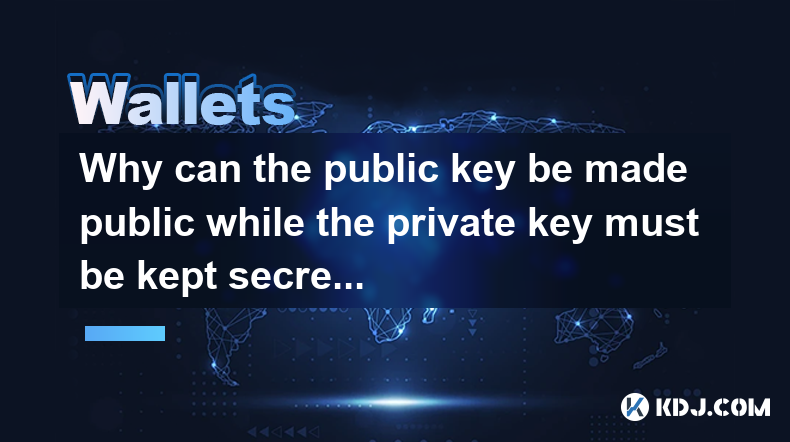
Key Points:
- Asymmetric cryptography, the foundation of public-key cryptography, utilizes a pair of keys: a public key and a private key.
- The mathematical relationship between these keys allows for encryption and decryption, digital signatures, and verification.
- Public keys can be freely shared without compromising security, while private keys must remain absolutely secret to maintain the integrity of the cryptographic system.
- Compromising a private key grants complete control over the associated cryptocurrency assets.
- Understanding the mathematical principles behind public-key cryptography is crucial to appreciating the security model.
Why Can the Public Key Be Made Public While the Private Key Must Be Kept Secret?
The security of cryptocurrencies like Bitcoin and Ethereum hinges on the principle of asymmetric cryptography, also known as public-key cryptography. This system uses two distinct keys: a public key and a private key. The seemingly paradoxical nature of one being public and the other private lies in their mathematical relationship and their respective functions.
The public key, as its name suggests, can be shared publicly without compromising security. Think of it as a digital mailbox address. Anyone can send you a message (cryptocurrency transaction) to this address, but only you, possessing the private key, can open the mailbox (access and spend the cryptocurrency).
The private key, conversely, must remain strictly confidential. This is analogous to your mailbox key. If someone else gets hold of it, they can access and empty your mailbox (steal your cryptocurrency). Its secrecy is paramount because it's the only key capable of decrypting messages encrypted with the corresponding public key.
The core of this system lies in a one-way function – a mathematical operation that is easy to compute in one direction but incredibly difficult to reverse. This one-way function links the public and private keys. Generating a public key from a private key is computationally straightforward, but deriving the private key from the public key is practically impossible with current computing power. This asymmetry is what provides the security.
This one-way function ensures that even if an attacker possesses the public key and intercepts a message encrypted with it, they cannot decrypt it without the private key. This is fundamental to secure transactions on the blockchain. Each cryptocurrency address is essentially a public key, allowing others to send funds to that address. Only the holder of the corresponding private key can spend those funds.
Let's delve deeper into the functionalities of each key:
The Public Key's Role:
- Receiving Funds: Your public key serves as your cryptocurrency address. Anyone wishing to send you funds uses your public key to encrypt the transaction details.
- Verification: In the context of digital signatures, the public key is used to verify the authenticity of a signature created using the corresponding private key. This confirms the transaction's origin and prevents forgery.
- Sharing: Public keys can be freely shared without security risk. This allows for easy and transparent transactions within the cryptocurrency network.
The Private Key's Role:
- Spending Funds: Only the holder of the private key can decrypt transactions addressed to their public key, thereby authorizing the spending of associated funds.
- Creating Signatures: The private key is used to create digital signatures that authenticate transactions and prove ownership.
- Secrecy: The private key's absolute secrecy is crucial. Its compromise results in the complete loss of control over the associated cryptocurrency. Losing access to the private key is akin to losing access to your bank account without any recourse.
The generation of these key pairs relies on complex mathematical algorithms, ensuring the inherent difficulty of deriving the private key from the public key. These algorithms typically involve prime numbers and elliptic curve cryptography. The strength of the cryptography depends on the size and complexity of these mathematical constructs.
The security of the entire system depends entirely on keeping the private key secret. Any compromise of the private key renders the corresponding public key useless in terms of security, as the attacker gains complete control over the associated funds.
Common Questions and Answers:
Q: What happens if I lose my private key?
A: If you lose your private key, you lose access to the cryptocurrency associated with that key. There is no recovery mechanism for lost private keys, making it crucial to store them securely.
Q: Can I recover my private key if I forget it?
A: No, private keys are not stored centrally, and there's no recovery method provided by the cryptocurrency system. They are generated through cryptographic algorithms and are not retrievable even with sophisticated techniques.
Q: How secure is public-key cryptography?
A: The security of public-key cryptography relies on the computational infeasibility of reversing the one-way function used to generate the key pair. While theoretically breakable, current computing power makes it practically impossible to crack securely generated keys. However, vulnerabilities can exist in implementations and practices surrounding key management.
Q: What are the best practices for securing my private keys?
A: Best practices include using hardware wallets for secure storage, regularly backing up your keys in multiple secure locations, and avoiding sharing your private keys with anyone. Never store your private key online or in easily accessible places.
Q: Are all public keys equally secure?
A: While the underlying cryptography is robust, the security of a public key depends heavily on the security of the corresponding private key. Weak or compromised private keys render the public key insecure regardless of the cryptographic algorithm used. Proper key generation and secure storage practices are paramount.
Disclaimer:info@kdj.com
The information provided is not trading advice. kdj.com does not assume any responsibility for any investments made based on the information provided in this article. Cryptocurrencies are highly volatile and it is highly recommended that you invest with caution after thorough research!
If you believe that the content used on this website infringes your copyright, please contact us immediately (info@kdj.com) and we will delete it promptly.
- Crypto Rollercoaster: Bitcoin, Altcoins, and the Wild Ride Ahead
- 2025-07-02 07:10:16
- Meme Coins Mania: Arctic Pablo Leads the New Crypto Pack
- 2025-07-02 06:30:11
- Meme Coins on the Move: Arctic Pablo, Bone ShibaSwap, and the Quest for the Next Big Thing
- 2025-07-02 06:30:11
- Crypto ETF Approval: Grayscale's Win & the SEC Rule Change
- 2025-07-02 07:10:16
- Toncoin's Price Wobbles: Engulfing Candle Holds the Key?
- 2025-07-02 07:15:11
- Crypto ETFs: Navigating the US Market Path and SEC Considerations
- 2025-07-02 06:50:12
Related knowledge
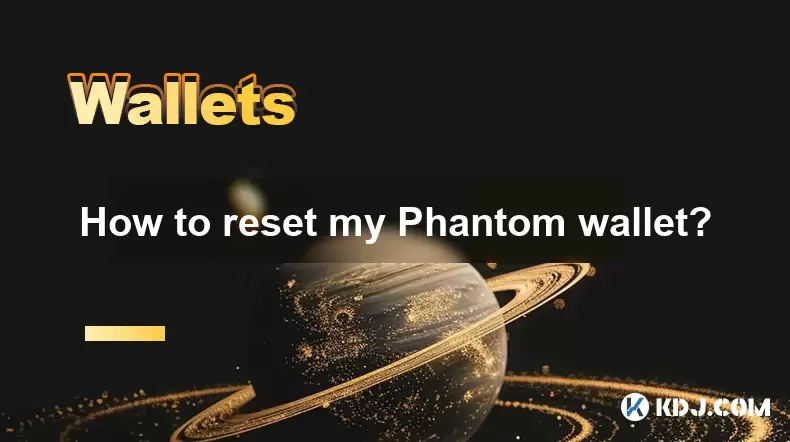
How to reset my Phantom wallet?
Jul 02,2025 at 12:36am
Understanding the Need for Resetting Your Phantom WalletIf you're using a Phantom wallet, you may encounter situations where resetting your wallet becomes necessary. This could be due to forgotten passwords, seed phrase issues, or account corruption. Phantom is a non-custodial wallet primarily used for interacting with the Solana blockchain, and it stor...
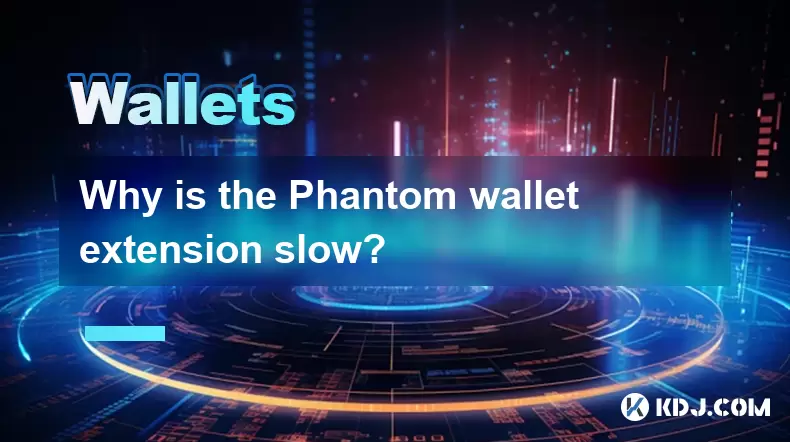
Why is the Phantom wallet extension slow?
Jul 02,2025 at 04:15am
Phantom Wallet Extension: Why Is It Slow?Phantom wallet is a widely used browser extension for interacting with decentralized applications (dApps) on the Solana blockchain. Despite its popularity, some users report that the Phantom wallet extension runs slowly at times. This article delves into potential reasons behind this performance issue and provide...
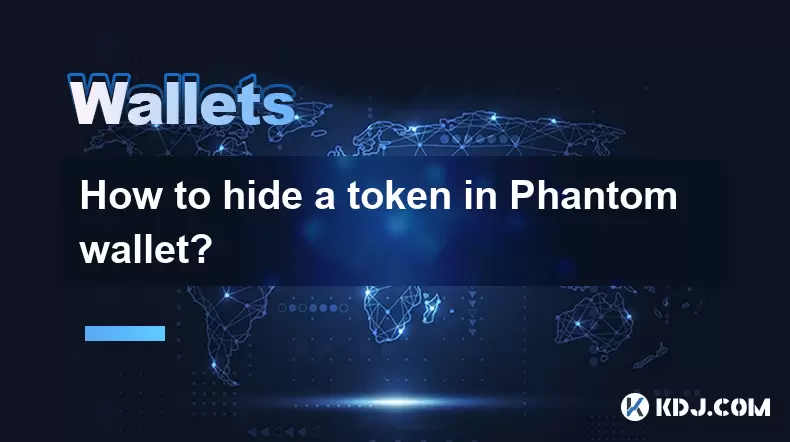
How to hide a token in Phantom wallet?
Jul 01,2025 at 05:49pm
Understanding the Phantom Wallet InterfacePhantom wallet is a popular non-custodial wallet used primarily for interacting with the Solana blockchain. It allows users to store, send, receive, and manage various tokens, including both fungible and non-fungible tokens (NFTs). Before attempting to hide a token, it's essential to understand how the wallet in...
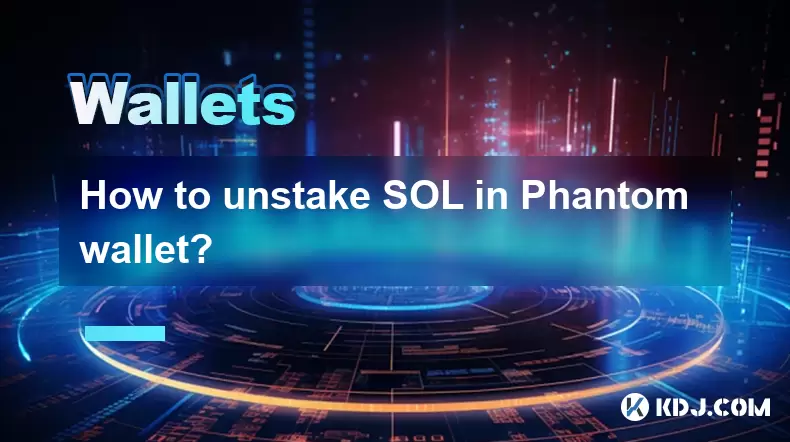
How to unstake SOL in Phantom wallet?
Jul 02,2025 at 06:49am
What Is Staking SOL in Phantom Wallet?Staking SOL involves locking up your SOL tokens to support the Solana network and earn rewards. The Phantom wallet, a popular non-custodial wallet for Solana, allows users to stake their SOL directly from the interface. When you stake SOL, it becomes temporarily unavailable as it is delegated to a validator. This pr...
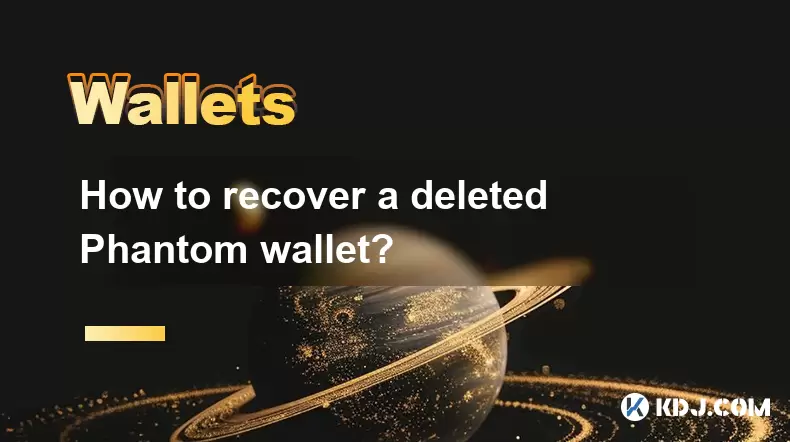
How to recover a deleted Phantom wallet?
Jul 02,2025 at 04:49am
What is a Phantom wallet?Phantom wallet is a popular non-custodial cryptocurrency wallet primarily used for interacting with the Solana blockchain. It allows users to store, send, receive, and manage digital assets like SOL tokens and NFTs. As a browser extension and mobile app, it provides a seamless interface for developers and traders alike. Since it...
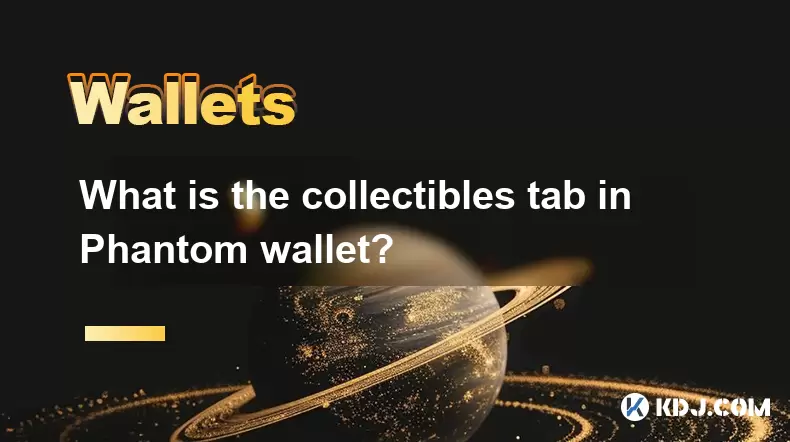
What is the collectibles tab in Phantom wallet?
Jul 02,2025 at 07:21am
Understanding the Collectibles Tab in Phantom WalletPhantom wallet is a non-custodial cryptocurrency wallet primarily used for interacting with the Solana blockchain. It allows users to store, send, and receive SOL tokens, as well as manage various types of digital assets including SPL tokens and NFTs (Non-Fungible Tokens). One of the key features withi...

How to reset my Phantom wallet?
Jul 02,2025 at 12:36am
Understanding the Need for Resetting Your Phantom WalletIf you're using a Phantom wallet, you may encounter situations where resetting your wallet becomes necessary. This could be due to forgotten passwords, seed phrase issues, or account corruption. Phantom is a non-custodial wallet primarily used for interacting with the Solana blockchain, and it stor...

Why is the Phantom wallet extension slow?
Jul 02,2025 at 04:15am
Phantom Wallet Extension: Why Is It Slow?Phantom wallet is a widely used browser extension for interacting with decentralized applications (dApps) on the Solana blockchain. Despite its popularity, some users report that the Phantom wallet extension runs slowly at times. This article delves into potential reasons behind this performance issue and provide...

How to hide a token in Phantom wallet?
Jul 01,2025 at 05:49pm
Understanding the Phantom Wallet InterfacePhantom wallet is a popular non-custodial wallet used primarily for interacting with the Solana blockchain. It allows users to store, send, receive, and manage various tokens, including both fungible and non-fungible tokens (NFTs). Before attempting to hide a token, it's essential to understand how the wallet in...

How to unstake SOL in Phantom wallet?
Jul 02,2025 at 06:49am
What Is Staking SOL in Phantom Wallet?Staking SOL involves locking up your SOL tokens to support the Solana network and earn rewards. The Phantom wallet, a popular non-custodial wallet for Solana, allows users to stake their SOL directly from the interface. When you stake SOL, it becomes temporarily unavailable as it is delegated to a validator. This pr...

How to recover a deleted Phantom wallet?
Jul 02,2025 at 04:49am
What is a Phantom wallet?Phantom wallet is a popular non-custodial cryptocurrency wallet primarily used for interacting with the Solana blockchain. It allows users to store, send, receive, and manage digital assets like SOL tokens and NFTs. As a browser extension and mobile app, it provides a seamless interface for developers and traders alike. Since it...

What is the collectibles tab in Phantom wallet?
Jul 02,2025 at 07:21am
Understanding the Collectibles Tab in Phantom WalletPhantom wallet is a non-custodial cryptocurrency wallet primarily used for interacting with the Solana blockchain. It allows users to store, send, and receive SOL tokens, as well as manage various types of digital assets including SPL tokens and NFTs (Non-Fungible Tokens). One of the key features withi...
See all articles

























































































